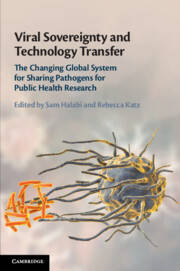 Viral Sovereignty and Technology Transfer
Viral Sovereignty and Technology Transfer from Part I - The Geopolitical, Historical, and Scientific Context
Published online by Cambridge University Press: 15 May 2020
Chapter 1 explains how the history of accessing pathogens for public health research closely follows the history of accessing other (non-pathogenic) genetic resources for all forms of biological research. The genetic resources that were previously considered to be the common heritage of humankind are now subject to (sometimes conflicting) claims of intellectual property protections and sovereign rights. The result is the enclosure of pathogens in legal schemes that have increased costs and created delays in accessing the pathogen samples that are vital to conducting infectious disease surveillance, pharmaceutical research and development, and informing the public health response to outbreaks. While the validity of gene patents (and therefore patents claiming the genomes of pathogens or part thereof) are now in question, access to pathogens is still encumbered by an increasingly complex set of access and benefit-sharing laws that vary across domestic jurisdictions. This chapter examines these historical developments, explaining how pathogens were eventually captured by a regulation that was originally designed as an environmental conservation mechanism, and the impacts of “hyperownership” on accessing pathogen samples for public health research.
To save this book to your Kindle, first ensure no-reply@cambridge.org is added to your Approved Personal Document E-mail List under your Personal Document Settings on the Manage Your Content and Devices page of your Amazon account. Then enter the ‘name’ part of your Kindle email address below. Find out more about saving to your Kindle.
Note you can select to save to either the @free.kindle.com or @kindle.com variations. ‘@free.kindle.com’ emails are free but can only be saved to your device when it is connected to wi-fi. ‘@kindle.com’ emails can be delivered even when you are not connected to wi-fi, but note that service fees apply.
Find out more about the Kindle Personal Document Service.
To save content items to your account, please confirm that you agree to abide by our usage policies. If this is the first time you use this feature, you will be asked to authorise Cambridge Core to connect with your account. Find out more about saving content to Dropbox.
To save content items to your account, please confirm that you agree to abide by our usage policies. If this is the first time you use this feature, you will be asked to authorise Cambridge Core to connect with your account. Find out more about saving content to Google Drive.